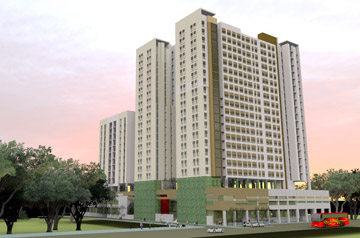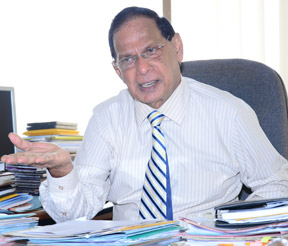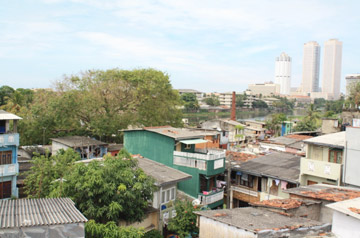Urban development goes on apace
By Dhaneshi Yatawara
The much-needed urban area development is moving to a new phase.
Urban area development which was earlier done without proper planning,
has now come into strategic focus under the Urban Development Authority
(UDA).
|

High-rise buildings in a well-planned environment |
"Changes began taking place after President Mahinda Rajapaksa handed
over the UDA to the Ministry of Defence in 2010," said Chairman of the
UDA Nimal Perera speaking to the Sunday Observer.
He said that the organisation which was once making immense losses
was now getting back to its prestigious position.
Excerpts of the interview:
Q: We see a drastic change in the Urban Development Authority and
much activity taking place. What is the present aim of the UDA?
A: The changes started taking place after President Mahinda
Rajapaksa brought the UDA under the Ministry of Defence in 2010 thus
making that ministry known as the Ministry of Defence and Urban
Development as we now know. Then the UDA started working under the
leadership of Secretary to the Ministry Gotabaya Rajapaksa. Organised
development in the urban areas of the country is our main
responsibility.
The UDA was set up in 1978 and since its inception never made a
profit. When the Defence Secretary took over, the carried forward loss
was 1.8 billion in 2010. The UDA was on the verge of closing down. In
2011 we made a profit of Rs. 225 million.
|

UDA Chairman Nimal Perera |
Recoveries from rented out places and lands that belonged to the UDA
was at a low level. By 2010 it was around 24% and under the guidance of
Secretary Gotabaya Rajapaksa we were able to increase it to 90%, thus
bringing us more income. We collected all our debts. We continue to earn
profits using existing resources.
Q: Though the UDA was set up in 1978 urban development was not
carried out in a proper way. It was so disorganised. How did this
change? What was the turning point?
A: Coming under the Ministry of Defence was a huge turning
point. It was methodical working with a Secretary like Gotabaya
Rajapaksa who first observes the situation thoroughly and then plans the
next steps to be implemented.
Even some in the UDA did not comprehend the vision of the UDA
earlier. So many officials came and went and many thought this was only
a regulatory body. That is in approving plans and giving a clearance
certificate or gazetting a Pradeshiya Sabha area and such activities.
Demarcating urban areas in the country is also a part of the UDA
responsibility but even that has was not done properly. I visited
Gampaha district last week and in that area there are at least another
three or four areas that need to be declared as urban areas. It has not
happened in the past years.
Not even towns close to Colombo have been declared urban areas. How
can one expect proper development in those townships? Now we are trying
to gazette Kelaniya, Minuwangoda, Ja-Ela and such areas.
|
Slave Island development
The Urban Development Authority, to free prime lands in Colombo city
for development activities, started resettling underserved families in a
more decent environment within close proximity to their original place
of residence. Construction work on around 15,000 house units is now in
progress in different locations within Colombo city.
"The seed capital for this housing program was generated by the UDA
through a debenture issue of Rs. 10 billion. Due to substantial costs
involved in the construction of houses for resettlement of shanty
dwellers, the UDA is exploring the possibility of getting private sector
participation for development of such lands," said UDA, Deputy Director
General, Planning and Operations, Weerasena Adikari.
It is under this concept that the development of prime lands in Slave
Island in Colombo 2 is going to take place.
"The UDA has identified a block of land of around eight acres in
Slave Island. This particular block of land had been fragmented into
smaller pieces over the years and that resulted in disputed titles of
those land plots. According to the survey carried out by the UDA, this
block of land is congested with 456 residential units and nearly 100
non-residential units, some without even basic facilities," Adikari
said.
The entire block is in a dilapidated condition.
"Even the residents cannot develop their lands as land titles were
unclear and facilities were limited," he said. Therefore, the UDA's
intervention was essential to clear out those bottlenecks and to use the
land for high rise mixed development projects harnessing the maximum
potential of this prime location in Colombo.
The plan
The UDA had collected details of those families in these lands
through a series of discussions and awareness programs. The UDA has
entered into an agreement with the families guaranteeing their rights to
get houses in needed extents and of better quality. Almost all the
families have agreed to renounce their rights to claim compensation for
the respective land plots as they will be provided with permanent houses
with all facilities within two to three years.
The UDA has proposed to pay them a monthly rent to vacate temporarily
for a two-year period. |
Under Gotabaya Rajapaksa's leadership we managed to expand urban
development to several areas in the country. One stop shops were set up
for the public as well as for investors. Many investors had given up
being unable to get permits and clearance to launch a business.
It was so complicated for them to get a plan approved. So bringing in
all the authorities to one place made this work less complicated and
benefited the country.
Q: How did the change in Colombo environment start?
A: Colombo was a dirty city then. Garbage was lying in piles
everywhere. There were no dustbins to put garbage. Under the
instructions of Secretary Rajapaksa all this came under a one system. He
then organised the Environment Police to monitor the cities so that
people do not pollute it with garbage. In addition to the Municipal
Councils and Pradeshiya Sabha cleaning system he outsourced the cleaning
to a few private companies with the sole aim of properly organising the
cleaning system of Colombo city.
Then places to dump the garbage were arranged out of the city limits.
Q: A lot of changes are taking place in the country's commercial
centre, the Colombo city. What is the plan and how would you describe
the present situation?
A: Yes, a lot of changes were initiated specially with regard
to pavement structures. Though certain concerned parties opposed we had
to move out the pavement vendors as a lot of accidents were taking place
with pedestrians being forced to walk on the road, specially in
congested areas like Pettah. We were strictly instructed by the
Secretary to ensure a separate place for the vendors to restart their
businesses. And that was done in the heart of Pettah.
Now the pedestrians can use the pavements without walking on the
roads and the businessmen can carry on their trade in a much better
place.Apart from being the commercial capital Colombo has a number of
heritage buildings constructed during Dutch and British era. They are
icons of the city and have the potential of being of high commercial
value.
When this came in to the attention of Secretary Rajapaksa he gave us
the green light to renovate suitable buildings. The first one was the
Dutch hospital. And now we are continuing with the Gaffoor building, and
former Auditor General's building at Independence square.
We are refurbishing these keeping the same structure. And the former
Marketing Department building in Colombo 7 is now being transformed in
to a high end market place. And within a short period these will be open
for businesses.
|

Poorly planned environment |
And now we are in the process of improving Janadhipathi Mawatha so
that people will have a beautiful area to walk around the President
house and garden - with open spaces and sceneries.
We plan to develop the Bank of Ceylon square as well - that is around
the former Bank of Ceylon head office. The surroundings of the Office of
the Inspector General of Police, Criminal Investigation Division will be
developed to suit a high commercial area.
And we will start on the Grand Oriental Hotel which is in front of
the Port. Located at a such a high profile spot, the GOH should be able
to attract the high end market easily.
Q: The UDA is an income generating institute. How is this going to
get revamped?
A: These renovated and newly constructed buildings and lands
belonging to UDA will definitely bring a lot of income as these will be
rented out to business ventures. That itself will be highly profitable.
|

